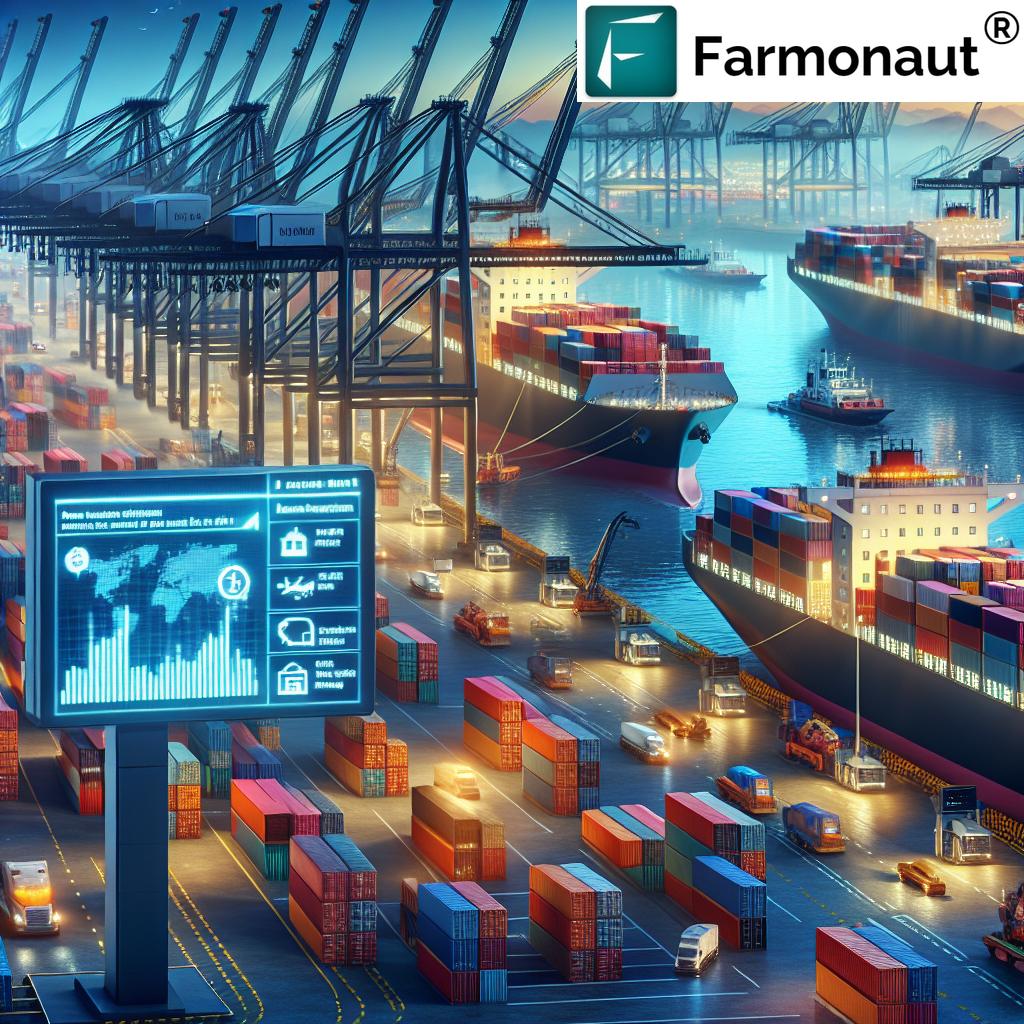Global Trade War Looms: How US Tariff Policies Are Reshaping International Commerce in 2024

“US tariffs on steel and aluminum imports affected over $50 billion worth of goods in 2023.”
As we delve into the complex world of international trade in 2024, we find ourselves at a critical juncture where US trade tariffs and global trade tensions have taken center stage. The implementation of import tariffs on goods from various countries has sparked concerns about a potential trade war, reshaping the landscape of international commerce. In this comprehensive analysis, we’ll explore the far-reaching implications of reciprocal tariffs and the evolving US tariff policy on global markets.
The Rising Tide of US Tariff Policies
Since his return to office in January, US President Donald Trump has been actively pushing for a variety of tariffs on imported goods, implementing previously announced measures and introducing new ones. His escalatory rhetoric on tariffs ranges from a general charge on all foreign imports to specific charges targeting select countries and sectors. This has created a climate of uncertainty for global trading partners as they await clarity on what measures may be imposed next.
One of Trump’s key philosophies includes a phased implementation of a universal tariff on all US imports. Treasury Secretary Scott Bessent suggested this might start at a modest 2.5% but could rise over time. However, Trump’s statements indicate he may favor much higher rates, with some tariffs reportedly exceeding 200%. Economists warn that such policies could be inflationary as businesses typically transfer the costs of tariffs onto consumers.
Reciprocal Tariffs: A New Paradigm in Trade Relations
On February 10, Trump declared intentions for “reciprocal” tariffs, aimed at nations that impose levies on US products. Though he has yet to define the specifics of these tariffs, the implications of such actions could lead to retaliatory measures from trading partners, particularly affecting US agricultural, energy, and machinery exports, thereby raising the specter of a potential trade war.
- Agricultural exports at risk
- Energy sector bracing for impact
- Machinery exports facing uncertainty
As we navigate these turbulent waters, it’s crucial for businesses and consumers alike to stay informed and adaptable. At Farmonaut, we understand the importance of data-driven decision-making in uncertain times. Our satellite-based farm management solutions provide real-time insights that can help agricultural businesses navigate market fluctuations and optimize their operations.
Impact on Major Trading Partners
Specific nations have drawn Trump’s attention for targeted tariffs. Mexico and Canada, currently the US’s largest trading partners, faced an announced tariff of 25% on February 4 in response to issues around migration and narcotics. However, this was delayed pending further negotiations until March 1. Trump’s insistence that neither country is doing enough to tackle these issues indicates a turbulent trade relationship ahead.
China has also been in the crosshairs, with a new 10% tariff taking effect, following a history of conflict between the two countries that incited economic distress on both sides. The European Union and Russia are other focuses of Trump’s tariff strategies, with Trump’s claims about unfair trade surpluses leading to potential tariff threats against EU goods. Additionally, he has warned Russia and other nations about increased taxes and sanctions should they fail to reach a resolution in the Ukraine conflict.
Emerging Markets in the Crosshairs
India and the BRICS countries are also targets of Trump’s tariff threats aimed at correcting perceived trade imbalances. Trump specifically labeled India as a “very big abuser” during his campaign, suggesting future tariff imposition if it does not alter its trade practices.
As these emerging markets face potential disruptions, it’s more important than ever for businesses to have reliable data and insights. Farmonaut’s API provides developers and businesses with access to crucial satellite and weather data, enabling them to make informed decisions in an ever-changing global market.
Sector-Specific Impacts
Trump has hinted at tariffs on various key sectors, including a blanket 25% tariff on Colombian goods due to migration issues, as well as potential tariffs on imported steel and aluminum. The US is notably the largest aluminum importer and has been facing a decade-long steel trade deficit.
Similarly, Trump has directed attention toward the semiconductor industry, announcing the possibility of imposing tariffs on imported computer chips, vital components in numerous tech products, particularly from Taiwan.
“The global semiconductor industry, valued at $600 billion, faces significant disruption due to US-China trade tensions.”
Pharmaceuticals and the automobile sector have not been exempt from Trump’s tariff discussions. He has considered placing tariffs on medications, a significant shift from the historical exemption of pharmaceuticals. For automobiles, speculative tariffs of up to 100% have been floated, particularly affecting imports from Canada and Mexico, a substantial market for both nations in the US.
| Trading Partner | Primary Affected Sectors | Estimated Tariff Rate (%) | Projected Annual Trade Impact ($ Billions) | Potential Retaliatory Measures |
|---|---|---|---|---|
| China | Electronics, Machinery | 10-25 | 200-300 | Tariffs on US agricultural products, aircraft |
| European Union | Automobiles, Steel | 25-100 | 50-100 | Tariffs on US tech, agricultural products |
| Canada | Steel, Aluminum, Automobiles | 25-100 | 30-50 | Tariffs on US consumer goods, steel |
| Mexico | Automobiles, Agriculture | 25-100 | 30-50 | Tariffs on US agricultural products, machinery |
The Bilateral Approach to Trade
Through these fluctuating policies, Trump is signaling a bilateral approach to trade, where tariffs can be used as tools for achieving his administrative goals and exerting pressure on foreign nations to comply with US demands. This approach not only risks trade relationships but also invites uncertainties that could disrupt global supply chains and economic stability across various sectors.
As businesses navigate these complex trade dynamics, having access to real-time data and insights becomes crucial. Farmonaut’s mobile applications offer on-the-go access to critical agricultural data, helping farmers and agribusinesses make informed decisions in a rapidly changing economic landscape.
Global Implications and Potential Trade War Scenarios
The implementation of these tariffs has far-reaching consequences that extend beyond the immediate economic impact. We’re witnessing a shift in the global trade paradigm that could reshape international relations and economic partnerships for years to come.
- Disruption of global supply chains
- Potential rise in consumer prices
- Shifts in manufacturing and production locations
- Changes in international investment patterns
As nations grapple with these new trade realities, the potential for a full-scale trade war looms large. Retaliatory measures from affected countries could escalate tensions, leading to a domino effect of tariffs and counter-tariffs across the globe.
The Role of Technology in Navigating Trade Uncertainties
In these uncertain times, technology plays a crucial role in helping businesses adapt and thrive. Farmonaut’s advanced satellite-based solutions offer valuable insights for the agricultural sector, which is particularly vulnerable to trade disruptions.
Our API Developer Docs provide detailed information on how to integrate our powerful tools into your existing systems, enabling your business to make data-driven decisions in real-time.
Impact on Consumers and Businesses
The ripple effects of these tariff policies are likely to be felt by consumers and businesses alike. Higher import costs often translate to increased prices for goods, potentially affecting everything from electronics to groceries.
- Potential increase in consumer prices
- Challenges for businesses reliant on imported goods
- Opportunities for domestic manufacturers
- Shifts in consumer behavior and purchasing patterns
For businesses, particularly those in the agricultural sector, adapting to these changes is crucial. Farmonaut’s solutions can help farmers and agribusinesses optimize their operations, potentially offsetting some of the challenges posed by changing trade dynamics.
The Future of Global Trade: Predictions and Scenarios
As we look towards the future, several potential scenarios emerge:
- Escalation of Trade Tensions: Continued implementation of tariffs could lead to a full-scale trade war, significantly disrupting global commerce.
- Negotiated Settlements: Diplomatic efforts may result in new trade agreements that address some of the concerns raised by the US administration.
- Shift in Global Supply Chains: Companies may restructure their supply chains to minimize exposure to tariffs, potentially leading to significant changes in global manufacturing patterns.
- Rise of Regional Trade Blocs: Countries may form stronger regional alliances to counterbalance the impact of US tariff policies.
Regardless of how the situation unfolds, businesses must remain agile and informed. Farmonaut’s cutting-edge technology can provide valuable insights to help navigate these uncertain waters.
Adapting to the New Trade Landscape
As businesses and governments navigate this complex trade environment, adaptability and informed decision-making become paramount. Here are some strategies that stakeholders can consider:
- Diversifying supply chains to reduce dependence on single markets
- Investing in domestic production capabilities
- Exploring new international markets to offset potential losses
- Leveraging technology for better forecasting and risk management
- Engaging in proactive dialogue with policymakers
In the agricultural sector, where trade policies can have significant impacts on both producers and consumers, staying ahead of the curve is crucial. Farmonaut’s advanced satellite-based solutions offer real-time insights that can help farmers and agribusinesses make informed decisions in this volatile environment.
The Role of International Organizations
As trade tensions escalate, international organizations like the World Trade Organization (WTO) may play a crucial role in mediating disputes and maintaining some semblance of order in global trade. However, the effectiveness of these organizations in the face of unilateral actions by major economies remains to be seen.
The coming months and years will likely see intense negotiations and potential reforms in international trade governance. Businesses and policymakers alike will need to stay informed about these developments and their potential impacts on global commerce.
Conclusion: Navigating Uncertain Waters
As we’ve explored in this comprehensive analysis, the current US tariff policies are reshaping international commerce in profound ways. From the potential for a global trade war to the sector-specific impacts across industries, the ramifications of these policies are far-reaching and complex.
In these uncertain times, having access to reliable data and insights is more crucial than ever. Farmonaut’s advanced satellite-based solutions offer valuable tools for businesses, particularly in the agricultural sector, to navigate these choppy waters. By leveraging cutting-edge technology and real-time data, companies can make informed decisions and adapt to the changing global trade landscape.
As we look to the future, it’s clear that the world of international trade is entering a new era. Those who can stay informed, adapt quickly, and leverage the right tools and technologies will be best positioned to thrive in this new environment.
Earn With Farmonaut: Affiliate Program
Earn 20% recurring commission with Farmonaut’s affiliate program by sharing your promo code and helping farmers save 10%. Onboard 10 Elite farmers monthly to earn a minimum of $148,000 annually—start now and grow your income!
Farmonaut Subscriptions
FAQ Section
Q: How are US tariff policies affecting global trade in 2024?
A: US tariff policies are causing significant disruptions in global trade, leading to increased tensions with major trading partners, potential retaliation, and reshaping of international supply chains. These policies are affecting various sectors, including steel, aluminum, semiconductors, and the automotive industry.
Q: What are reciprocal tariffs, and how might they impact international trade?
A: Reciprocal tariffs are levies imposed by the US on goods from countries that have tariffs on US products. This approach could lead to retaliatory measures from trading partners, potentially escalating into a trade war and affecting US exports, particularly in sectors like agriculture, energy, and machinery.
Q: How are emerging markets like India and BRICS countries affected by US tariff threats?
A: Emerging markets are facing potential disruptions due to US tariff threats aimed at correcting perceived trade imbalances. This could lead to economic challenges for these countries and may result in shifts in global trade patterns.
Q: What strategies can businesses adopt to navigate the changing trade landscape?
A: Businesses can adapt by diversifying supply chains, investing in domestic production, exploring new markets, leveraging technology for better forecasting and risk management, and engaging in proactive dialogue with policymakers. Tools like Farmonaut’s satellite-based solutions can provide valuable insights for decision-making in this volatile environment.
Q: How might these tariff policies affect consumers?
A: Consumers may face higher prices for goods as businesses often transfer the costs of tariffs to end-users. This could affect a wide range of products, from electronics to groceries, potentially leading to changes in consumer behavior and purchasing patterns.









